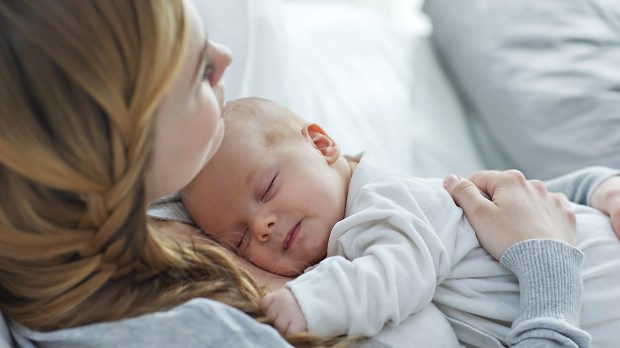A healthy, beautiful baby has been born and everyone is happy—everyone except the new mother. It’s not unusual: it’s estimated that more than half of women experience what is called “postpartum sadness,” baby blues,” or “maternity melancholy” two to three days after giving birth. This situation can last for a couple of weeks.
Read more:
An Old World Mary Poppins beats my postpartum blues
What is postpartum depression?
It’s a normal, physiological thing: the woman’s body has been making a huge effort during pregnancy and childbirth. Many new mothers are physically exhausted and anemic, and now they have to take care of the baby, with the consequent sleep deprivation, especially if she already has other children. And all of this while she’s in the midst of hormonal changes and sometimes other additional difficulties—financial struggles, being far from her family, etc.
But postpartum depression is much more than baby blues: it’s a problem that can have serious consequences for the mother’s and baby’s health. In its extreme form, it can degenerate into psychotic depression or mania, and may even require the mother to be hospitalized.
Postpartum depression isn’t a transitory episode of sadness: it can appear weeks or even months after childbirth, or can even be the exacerbation of depression that began before or during pregnancy. It affects around 7 to 19 percent of women, and is especially likely when dealing with women who suffer from bipolar disorder or major depression due to other causes.

Read more:
John Legend nails postpartum depression: ‘A lot of women feel alone’
Risk factors also include financial difficulties, problems at work, or—still worse—grieving the death of a family member or close friend.
What is the main complication associated with postpartum depression? Above all, the difficulty women experience in acknowledging it. Many women are reluctant to admit to their symptoms of sadness, since they feel ashamed or stigmatized, and they are preoccupied because their child might need medical assistance.
Obviously, the symptoms of depression are significantly more intense when the mother was not prepared to welcome a new child, due to questions of age (such as teen pregnancy), or due to the pregnancy being unwanted—or when the father has abandoned her, or she is overworked at her job.
But even in these circumstances, social aspects are not the determining factor: there are women who apparently have no problems of this kind, and who experience depression just the same. Why? Because hormonal and psychological factors (lack of affection in childhood, for example) also contribute to depression.
Why is it important to identify?
It is important to support and help mothers who experience these symptoms, because treating them preventively could avoid many cases of unnecessary psychological suffering. The mother’s stability is fundamental for the newborn baby, above all from an emotional standpoint. It is important that she ensure that the baby is well fed, getting proper sleep, and experiencing peace and calm during the first few months. It is during this first stage when the baby develops emotional attachment, which is so important for his or her mental health as an adult.
Some symptoms of moderate depression include: depressed mood beyond what is normal for that person, general loss of interest, and decreased energy.
Depression may be categorized as moderate or severe if the intensity of any of the following symptoms increases: lack of confidence, excessive feelings of guilt, recurring thoughts of suicide, lack of concentration, excessive agitation, difficulties sleeping, or radical changes of appetite (a notable decrease or increase).
If postpartum depression is detected late or is not discovered at all, it can have serious and undesirable consequences. Let us keep in mind that the symptoms can increase with the return of menstruation, due to the hormonal fluctuations involved.
Read more:
The Most Merciful Gift You Can Give to a New Mom
Coping strategies
Some advice for managing postpartum depression.
- The first piece of advice is to ask for help from professionals (doctors, psychologists, and psychiatrists) in order to keep the situation under control and intervene with antidepressants when necessary.
- Episodes of severe mood swings, such as postpartum psychosis, are a psychiatric emergency and almost always require the woman to be hospitalized, together with her baby.
- Each woman responds differently to the use of antidepressants, and so it is recommended that she be under the care of a specialist—also after ceasing treatment, so as to avoid relapses.
- There are women who begin to experience symptoms of depression before getting pregnant. This is why psychological help could even begin before childbirth as a preventative measure.
- It is vital for women to be well-informed about these subjects, going to childbirth preparation courses with their spouse or partner. They should have a person they trust within their own family with whom they can talk and whom they can ask for help if necessary. Ideally, it should be their spouse or partner.
- It is important to decrease work obligations and carefully protect sleep time so as to be able to rest and foster a peaceful atmosphere in the home.
- One of the most important things is for the woman to be more understanding with herself and accept all the help that might be offered, leaving aside non-essential tasks. If the weeks pass and she doesn’t feel better, the best course of action is to openly ask for help.

Read more:
Emotional video tells overwhelmed moms what they need to hear (VIDEO)
For the good of mother and baby
Adapting to maternity can be difficult, above all if you were expecting all your feelings to be positive after having a baby. What matters most is to see all of this as a moment of transition, as something very normal, with the certainty that soon all will return to a proper equilibrium.
The mother’s physical and psychological well-being must be a priority in the family, both for the woman and for the newborn child. The emotional warmth of children throughout their lives begins in the first weeks and months of life. A mother’s emotional stability is an advantage that every child should enjoy.
This article was written in collaboration with Javier Fiz Pérez, a psychologist, professor of psychology and delegate for the development of international research at the European University of Rome and Scientific Research Director at the European Institute of Positive Psychology.
This article was originally published in the Spanish edition of Aleteia.

